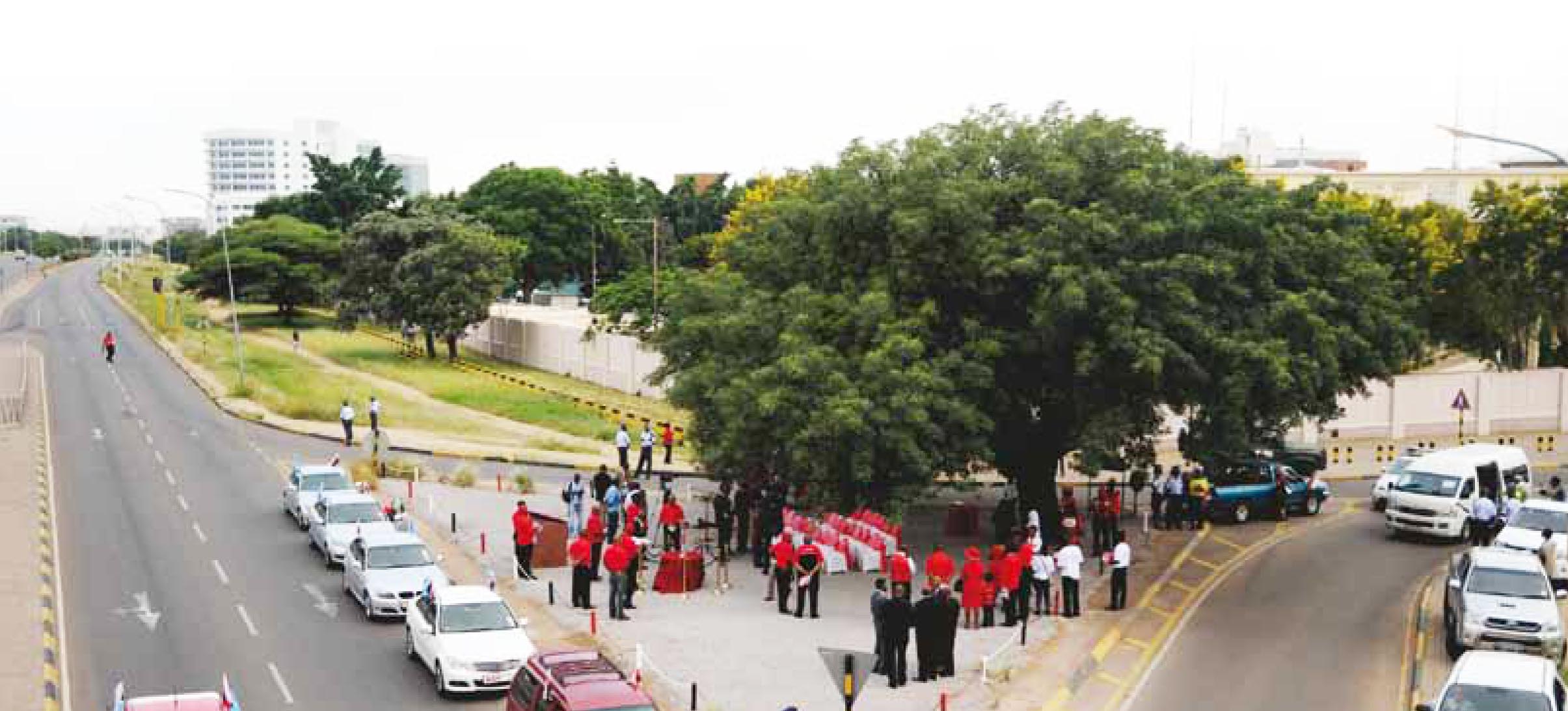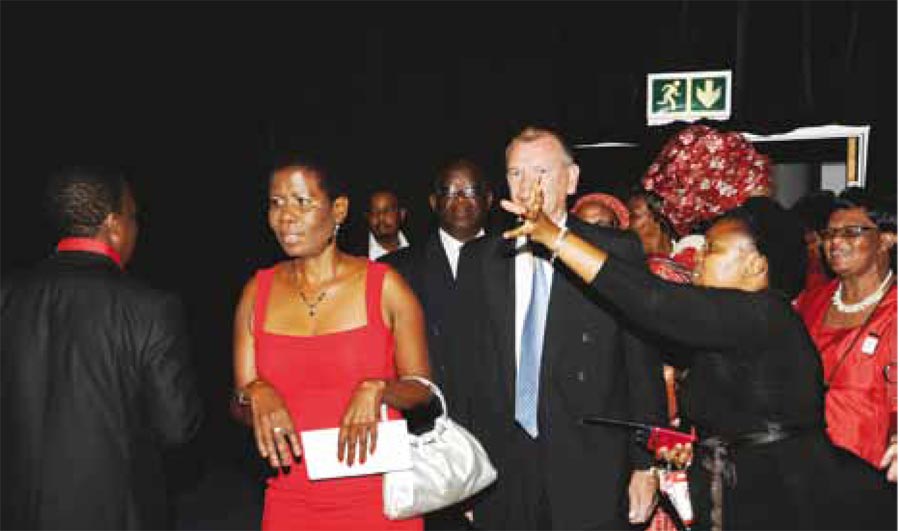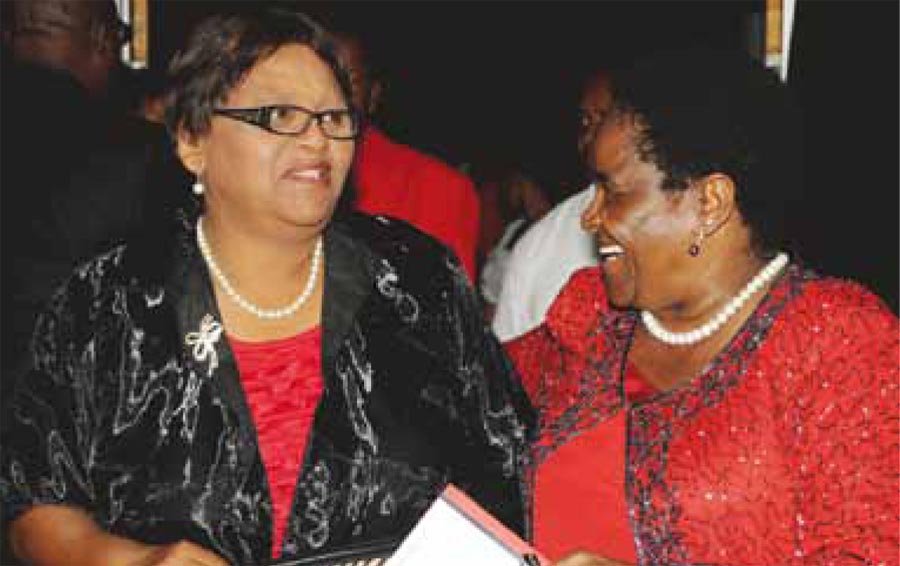BDP celebrates Fifty
Source : Kutlwano
Author : Pako Lebanna
Location : Gaborone
Event : Event
The relative cool of the night gave way to the warmth of the rising sun, an early indication of the searing heat that would charactarise Saturday February 25, 2012 in the city of Gaborone.
Some of the stalwarts who were midwives at Botswana’s independence, guiding the modern republic through its nascent stage, had gathered beneath a morula tree adjacent Orapa House and close to the United States embassy - a place of great historical relevance to them.
They had come to commemorate the 50th anniversary of the founding of the Botswana Democratic Party (BDP). These were elders of the party and state joined by President Lt General Seretse Khama Ian Khama, former presidents Sir Ketumile Masire and Festus Mogae, Tanzanian President Jakaya Kikwete, South Africa’s Deputy President, Kgalema Motlanthe, among other dignitaries.
Looking at the country’s proud transformation from one of the world’s poorest, least developed nations to middle income status, and retaining democratic traditions at a time of continental and global upheavals of the turbulent 1960s to early 1990s, one notes that those who congregated had reason to celebrate.
It is common knowledge in Botswana’s historical and political discourse how BDP founders - Sir Seretse Khama, Sir Ketumile Masire, Amos Dambe, Archeous Tsoebebe, Kebatlamang Morake, and other stalwarts such as Archie Mogwe, Daniel Kwelagobe, Festus Mogae - contributed immensely to the development of a then very vulnerable nation-state.
Together with their contemporaries in the political opposition, such as Botswana People’s Party (BPP) founders, Kgalemang Motsete, Motsamai Mpho and Philip Matante, as well as Dr Kenneth Koma, Klass Motshidisi, Maitshwarelo Dabutha, Mareledi Giddie, Paul Rantao and others in the Botswana National Front (BNF), they were instrumental in cementing a multi-party democratic state over the first few decades of the country’s independence.
It is universally accepted that the genesis of the post-colonial African state has been one wrought with maladministration, corruption, nepotism, and underdevelopment.
However, to many observers, Botswana has stood out as a worthy developmental model. The country quietly went through 10 general elections without even a single person dying of political violence, and without political prisoners.
This is a breath of fresh air for a territory that was declared “the hopeless continent” by a now famous edition of the influential British magazine, the Economist on 13 May 2000, with the following damning note on the state of Africa:
“No one can blame Africans for the weather (floods, famine), but most of the continent’s shortcomings owe less to acts of God than to acts of man. These acts are not exclusively African- brutality, despotism and corruption exist everywhere- but African societies, for reasons buried in their cultures, seem especially susceptible to them,” (the Economist, 2000).
Many would have sensed cultural relativism in the Economist article (‘reasons buried in their cultures’).
However, something the entire continent should be proud of is the fact that Botswana in September 2011 celebrated 45 years of independence without even a single assassinated politician, with every Botswana parliament since 1965 having had a political opposition.
The country went from being an underdeveloped backwater, with low literacy rates, very little infrastructure- just six kilometres of tarred roads in the 1960s- to being a modern middle income state within four and half decades.
The BDP celebrated the 50th anniversary of its 1962 formation, knowing full well that, having governed Botswana since 1965, the year Bechuanaland attained self-government ahead of full independence in 1966, and having steered the country through its nascent years, had a lot to be proud of.
The virtues of the BDP were extolled - Sir Ketumile remembered how he and his companions gathered full of hope for the future of the country.
“The Botswana People’s Party (BPP) had been founded in 1960, but we felt that they preached radical politics that were not suited for our country. We felt the need to establish a pragmatic political organisation that was moderate and suits Botswana’s circumstances,” remarked Sir Ketumile.
This was during an era after British Prime Minister, Harold MacMillian, gave the landmark “Winds of Change” speech to the South African parliament in Cape Town. It was a time when the struggle for independence had gained currency throughout Africa.
What in some countries turned out to be bloody conflicts for self- determination, was a peaceful negotiated settlement towards independence in Botswana as the British were always less likely to commit troops to battle for a highly undeveloped territory.
For Sir Ketumile, the BDP founders that had initially gathered at Lobatse in 1961 had wanted an organisation that represented the popular aspirations of Batswana.
After another meeting in Mahalapye, the BDP founders resolved to officially launch their party at Mochudi, on February 28, 1962.
Notwithstanding, Sir Ketumile, who was tasked with organising that day’s events, was told in no uncertain terms by the then Bakgatla regent, Kgosi Mmusi Pilane, that he would not entertain partisan politics in his territory.
“We chose to go to a neutral venue, that is how we ended up at the morula tree next to the Gaborone train station,” recalled Sir Ketumile.
At the University of Botswana stadium, guest speaker, President Kikwete, noted his organisation, the governing Chama Cha Pinduzi, had a long relationship with the BDP since the era of the two countries’ founding presidents, Julius Nyerere and Sir Seretse Khama.
“They were close friends and comrades in arms. They worked together like hand in glove to assist our brothers and sisters of Mozambique, Angola, Zimbabwe, Namibia and South Africa in their just struggle against colonialism, minority rule and apartheid.
They also worked together to forge regional economic cooperation among countries of Southern Africa,” said Kikwete.
He praised Botswana for being supportive of the liberation movements despite the bullying tactics of the neighbouring settler-states. He cited cross border raids, in particular the Gaborone raid, “which took place on 14 June 1985, where people were killed and several wounded.”
President Kikwete noted that Botswana also played a critical role in the establishment of the Southern African Development Coordinating Conference (SADCC) in 1980, and that it is “by no accident or chance that the headquarters of SADCC was situated in Gaborone and Sir Seretse Khama was chosen by his peers to be its Chairman. It speaks volume about Botswana’s role.”
Also, President Kikwete made mention of the fact that Sir Seretse’s successor, Sir Ketumile Masire, assumed the chairmanship of the regional body and oversaw its transformation into the Southern African Development Community (SADC).
“No Sub-Saharan African country has been as successful as Botswana in terms of GDP per capita growth over the last 50 years, and this would not have been possible without the sound economic policies of the BDP, many in Africa would like to learn from you,” stated Kikwete.
The BDP was proud that their record in government was being recognized on a regional scale.
“As a party, we are encouraged by the continued support of our fraternal friends from neighbouring countries who have joined us today and of course whose relationship with us can be described as mutual, cordial and excellent,” said Vice President Lt Gen Mompati Merafhe.
Meanwhile, the BDP turned 50 after experiencing its biggest split with the formation of the Botswana Movement for Democracy (BMD) in 2010, and facing great discontent among the working class as evidenced by the 2011 civil service strike.
Later in the evening, former president Festus Mogae noted the many challenges that still faced governing parties.
“The challenges facing African leaders and ruling parties include land management, food production, poverty alleviation, employment creation, relevant education and training, environment and climate change issues, HIV and AIDS as well as infrastructure development for both domestic growth and regional integration,” said Mogae.
The award winning economist and statesman was of the viparty had to be challenged in future.
“I wish Botswana opposition parties good cooperation to win the 2019 ew that for Botswana’s democracy to further be nurtured, the dominance in government by a singular elections when they would be ready to rule. They cannot and should not take over before 2016 because they would not know how to celebrate half a century as the majority of their leadership is not yet forty. Otherwise with maturity they will do well in 2019,” added Mogae.
His speech at the BDP dinner at Boipuso Hall in Gaborone brought to a close a great day of celebration of the party in government and democrats partied into the night, the searing heat of midday long forgotten.
Teaser:
We chose to go to a neutral venue that is how we ended up at the morula tree.
















